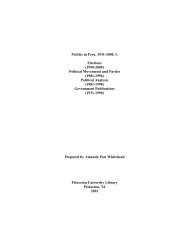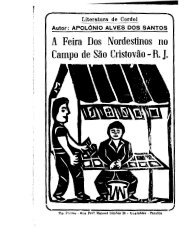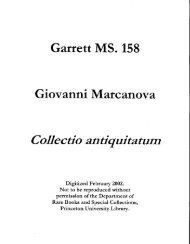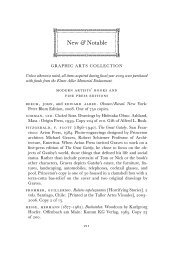Create successful ePaper yourself
Turn your PDF publications into a flip-book with our unique Google optimized e-Paper software.
his poetry from too much compromising analysis, while I was trying<br />
very hard to extract any sort of interpretation that could be<br />
turned into critical prose. At one point I suggested that part of the<br />
obscurity I was encountering in his poems derived from the absence<br />
of punctuation, and I cited a specific passage — I think it<br />
was in Mythistorema 12 — where the addition of a comma at the end<br />
of a line might make all the difference. The poet just stared at me,<br />
but from the other end of the room, Maro Seferis’s voice rang out<br />
in a deep lament: “Put in a comma for the boy, George, help him,<br />
for heaven’s sake” (Vale ena comma yia to pedi, Yiorgo, voithise<br />
ton, yia onoma tou theou).<br />
I learned an important lesson from this encounter, soon reinforced<br />
by my experience with other self-assured artists of some<br />
stature. No poet worth his or her salt, however generous to the<br />
young or the old, is going to restrict the richness of his or her verse<br />
by giving an unassailably precise reading of this or that line, especially<br />
in front of somebody aspiring to put that reading into the<br />
relative permanence of print, whether in Greek or in English or in<br />
some other language. Seferis’s generosity was large enough to allow<br />
him to forgive my post-graduate assault on his work, and this<br />
first meeting did not preclude others that eventually led to an easy<br />
kind of friendship. And I think that friendship emerged partly because<br />
I was never again eager to ask him a question that might<br />
lead to a specific interpretation of one line or another, or even to a<br />
bit of extra punctuation, though I did ask him questions of a broader<br />
kind in the interview that I conducted in 1968, some sixteen years<br />
after this first meeting, when the poet was himself an “advanced<br />
student,” as he put it, at the Institute for Advanced Study in Princeton.<br />
1955–1959<br />
The correspondence in these years has to do mostly with my early<br />
efforts to translate and publish some of Seferis’s poetry in the United<br />
States and, more substantially, with a 1956 essay I wrote on the<br />
relationship between the poetry of Seferis and that of T. S. Eliot<br />
and with the anthology of six Modern Greek poets that Philip<br />
Sherrard and I met to plan in 1955 and completed in 1959. My<br />
letter to Seferis in April 1955 antecedes this long-term project but<br />
12 George Seferis: Collected Poems, pp. 3–28.<br />
373















